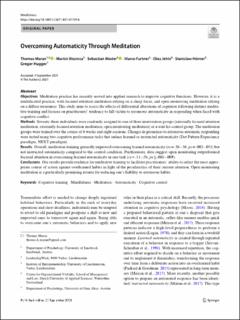Bitte benutzen Sie diese Kennung, um auf die Ressource zu verweisen:
https://doi.org/10.21256/zhaw-23296| Publikationstyp: | Beitrag in wissenschaftlicher Zeitschrift |
| Art der Begutachtung: | Peer review (Publikation) |
| Titel: | Overcoming automaticity through meditation |
| Autor/-in: | Maran, Thomas Woznica, Martin Moder, Sebastian Furtner, Marco Jehle, Elias Hörner, Stanislaw Hugger, Gregor |
| et. al: | No |
| DOI: | 10.1007/s12671-021-01749-8 10.21256/zhaw-23296 |
| Erschienen in: | Mindfulness |
| Erscheinungsdatum: | 23-Sep-2021 |
| Verlag / Hrsg. Institution: | Springer |
| ISSN: | 1868-8527 1868-8535 |
| Sprache: | Englisch |
| Schlagwörter: | Automaticity; Cognitive control; Cognitive training; Mindfulness |
| Fachgebiet (DDC): | 150: Psychologie |
| Zusammenfassung: | Objectives Meditation practice has recently moved into applied research to improve cognitive functions. However, it is a multifaceted practice, with focused attention meditation relying on a sharp focus, and open monitoring meditation relying on a diffuse awareness. This study aims to assess the effects of differential alterations of cognition following distinct meditative training and focuses on practitioners’ tendency to fall victim to erroneous automaticity in responding when faced with cognitive conflict. Methods Seventy-three individuals were randomly assigned to one of three intervention groups (internally focused attention meditation, externally focused attention meditation, open monitoring meditation) or a wait list control group. The meditation groups were trained over the course of 4 weeks and eight sessions. Changes in proneness to erroneous automatic responding were tested using two cognitive performance tasks that induce learned or instructed automaticity (Dot Pattern Expectancy paradigm, NEXT-paradigm). Results Overall, meditation training generally improved overcoming learned automaticity (rs?=?.26–.36, ps?=?.002–.031) but not instructed automaticity compared to the control condition. Furthermore, data suggest open monitoring outperformed focused attention in overcoming learned automaticity in one task (rs?=?.31–.56, ps?=?.001–.009). Conclusions Our results provide evidence for meditative training to facilitate practitioners’ ability to select the most appropriate course of action against overlearned habits in light of the peculiarities of their current situation. Open monitoring meditation is a particularly promising avenue for reducing one’s liability to erroneous habits. |
| URI: | https://digitalcollection.zhaw.ch/handle/11475/23296 |
| Volltext Version: | Publizierte Version |
| Lizenz (gemäss Verlagsvertrag): | CC BY 4.0: Namensnennung 4.0 International |
| Departement: | School of Management and Law |
| Organisationseinheit: | Institute for Organizational Viability (IOV) |
| Enthalten in den Sammlungen: | Publikationen School of Management and Law |
Dateien zu dieser Ressource:
| Datei | Beschreibung | Größe | Format | |
|---|---|---|---|---|
| 2021_Maran_Overcoming_Automaticity_Through_Meditation_Mindfulness.pdf | 1.2 MB | Adobe PDF |  Öffnen/Anzeigen |
Zur Langanzeige
Maran, T., Woznica, M., Moder, S., Furtner, M., Jehle, E., Hörner, S., & Hugger, G. (2021). Overcoming automaticity through meditation. Mindfulness. https://doi.org/10.1007/s12671-021-01749-8
Maran, T. et al. (2021) ‘Overcoming automaticity through meditation’, Mindfulness [Preprint]. Available at: https://doi.org/10.1007/s12671-021-01749-8.
T. Maran et al., “Overcoming automaticity through meditation,” Mindfulness, Sep. 2021, doi: 10.1007/s12671-021-01749-8.
MARAN, Thomas, Martin WOZNICA, Sebastian MODER, Marco FURTNER, Elias JEHLE, Stanislaw HÖRNER und Gregor HUGGER, 2021. Overcoming automaticity through meditation. Mindfulness. 23 September 2021. DOI 10.1007/s12671-021-01749-8
Maran, Thomas, Martin Woznica, Sebastian Moder, Marco Furtner, Elias Jehle, Stanislaw Hörner, and Gregor Hugger. 2021. “Overcoming Automaticity through Meditation.” Mindfulness, September. https://doi.org/10.1007/s12671-021-01749-8.
Maran, Thomas, et al. “Overcoming Automaticity through Meditation.” Mindfulness, Sept. 2021, https://doi.org/10.1007/s12671-021-01749-8.
Alle Ressourcen in diesem Repository sind urheberrechtlich geschützt, soweit nicht anderweitig angezeigt.